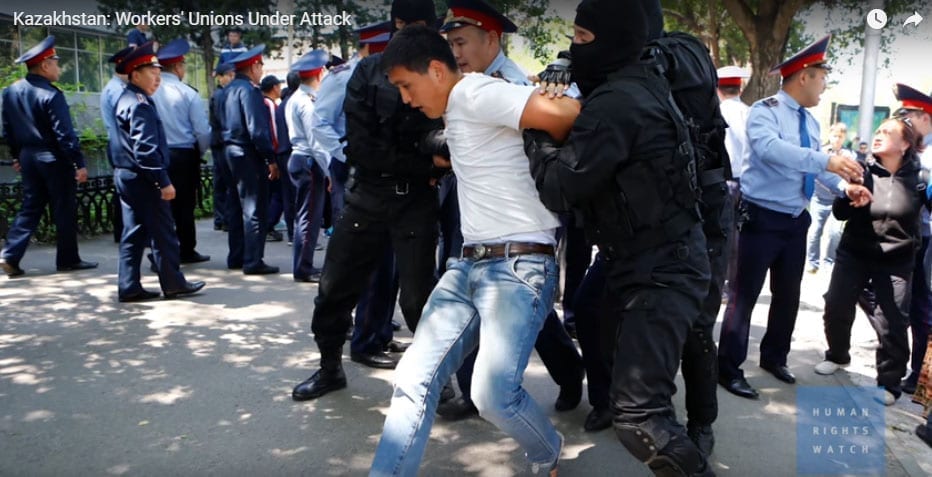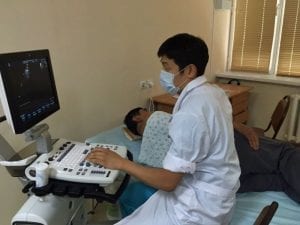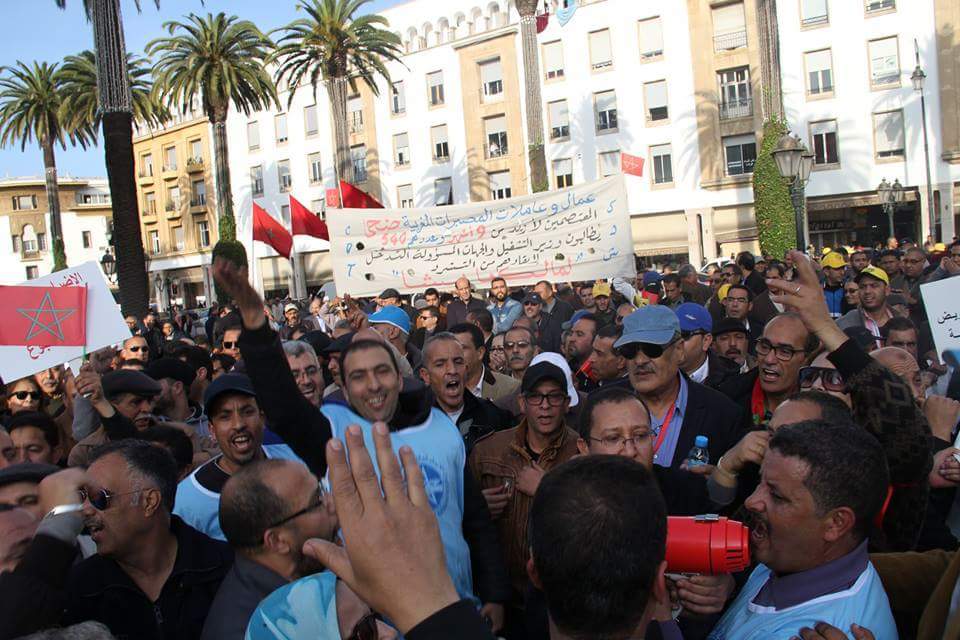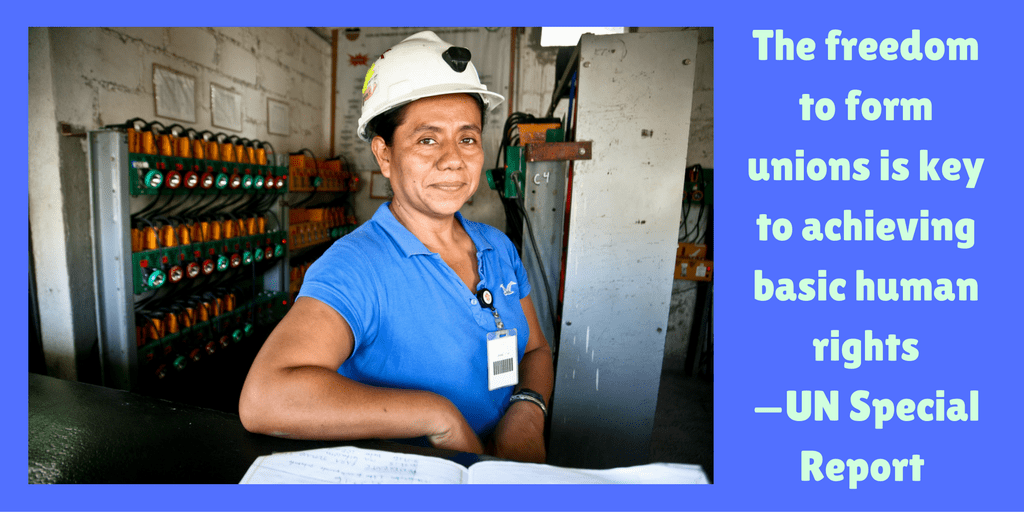
Oct 31, 2016
Millions of workers in the global economy have been disenfranchised from their rights, either tacitly or deliberately by governments, exacerbating “global inequality, poverty, violence and child and forced labor,” says Maina Kiai, United Nations Special Rapporteur on the rights to freedom of assembly and of association, in a frank report presented last week to the United Nations General Assembly in New York.
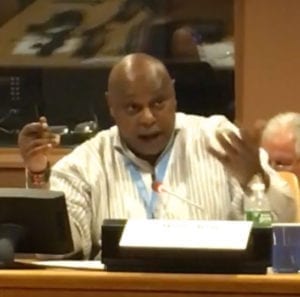
UN Special Rapporteur Maina Kiai says without freedom to form unions, workers have little power to change economic inequality. Credit: Solidarity Center
The Special Rapporteur also launched the report on workplace rights at a side event at UN headquarters, where he warned of “an assault on labor” that has been going on for years. The side event was co-sponsored by the Solidarity Center, AFL-CIO, Ford Foundation, Human Rights Watch and the International Trade Union Confederation. Shawna Bader-Blau, executive director of the Solidarity Center, facilitated the discussion.
Kiai’s report reveals that the majority of the world’s workers are sidelined, particularly women, migrant workers and people laboring at the bottom end of supply chains, without legal protections and denied a voice. Lacking assembly and association rights, he says, workers have little leverage to change the conditions that “entrench poverty, fuel inequality and limit democracy.”
Speakers at the side event confirmed that the erosion of rights in the workplace is a reality around the world. Over the course of four hours, panelists discussed freedom of assembly and association (FOAA) as it relates to fundamental human rights, working women, migrant workers and supply chains, business and human rights. Watch the video here.
Union Leaders, NGOs Describe Assaults on Worker Rights
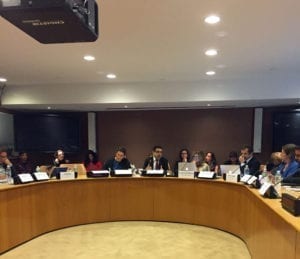
Union leaders and other human rights defenders discussed freedom of assembly and association and its connection to basic human rights. Credit: Solidarity Center
Kyoung-Ja Kim, vice president of the Korean Confederation of Trade Unions, (minute 5:15) told the packed meeting room that workers in Korea who exercise their rights “are often treated as criminals.” She described a July 2016 march in support of worker rights, which ended with a violent police response that left a 69-year-old protester dead. Police were given immunity, yet the organizer of the protest was jailed, said Kim. In addition, when crane workers tried to negotiate with their employer and were refused, they went on strike. Their union was charged with a crime and leaders were convicted.
Swaziland, Africa’s last absolute monarchy, has lost access to the Africa Growth and Opportunity Act due to non-compliance with internationally recognized worker rights, said Vincent Ncongwane, secretary general of the Trade Union Confederation of Swaziland (min. 15:12). In addition, people are losing access to land. They are being evicted for their exercise of freedom of speech. And the right to protest is limited, he said.
Monserrat Mir Roca, confidential secretary of the European Trade Union Confederation, (min. 24:16) said that the right to strike is recognized in the constitutions of many European countries, and trade unions are recognized as legal actors to negotiate for better conditions for workers.
However, “Europe is in a crisis moment, and the first thing that governments try to do is reduce the right to freedom of association, the freedom to be in a trade union and to engage in collective bargaining actions.” Globalization, she said, has also globalized the response by governments and companies to economic downturns, to the detriment of workers. Strike leaders are threatened with criminal charges and long jail sentences in Spain, for example. In response, “we are engaging all our members to defend, in national parliaments, the right to freedom of association,” she said. “Democracy is in danger the moment trade union rights are not recognized.”
It is important that Paragraph 56 of the Special Rapporteur’s report “unambiguously defends the right to strike,” including as a matter of customary international law, said Jeff Vogt, (min: 32:30), director of the legal unit at the International Trade Union Confederation (ITUC). He said attacks on freedom of association rights are increasing in frequency and come from surprising quarters, including the Employers Group at the International Labor Organization (ILO).
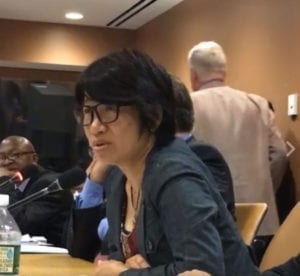
“In many nations of the world … domestic workers have not been recognized as workers … or even as human beings”—Elizabeth Tang Credit: Solidarity Center
“Since 2012, we have been in a pitched battle with the Employers Group at the ILO regarding the existence—the mere existence—of the right to strike. We have all assumed that the right has existed at the international level for a very long time and, at the very least, with the entry into force of Convention 87 of the ILO, which is the convention on freedom of association.” The right to freedom of association at work assumes the right to gather together, form organizations, bargain collectively and to strike, he said. Without all of those elements together, “the right is meaningless.” Indeed, a German legal decision said that “the right to collective bargaining without the right to strike is collective begging.”
Meanwhile, domestic workers are among the least protected of workers around the world, said Elizabeth Tang, general secretary of the International Domestic Workers Federation (min. 40:16). “In many nations of the world, for generations, domestic workers have not been recognized as workers … or even as human beings,” she said. “Ninety percent of the 60 million domestic workers lack effective social protections—and that is no accident. Where domestic workers are not recognized as workers, they cannot form trade unions.”
The participation of women in the labor market has increased—but has not been the often touted panacea for economic growth or women’s economic empowerment, according to Chidi King, director of the ITUC equality department, who moderated the panel examining issues related to working women and freedom of association (min. 49:30). On the contrary: The majority of jobs for women around the world are informal, precarious, pay poverty wages and are exploitative, with violence on the job a serious issue, she said.
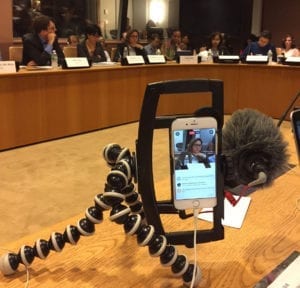
Evangelina Argueta said women garment workers in Honduras have made some gains—through their unions—in boosting wages and making workplace safer, but women in export agriculture sometimes risk their lives when exercising their rights at work. Credit: Solidarity Center
Evangelina Argueta, who coordinates maquila organizing for the General Workers Confederation (CGT) of Honduras, (min. 57:24), said that while women garment workers—through their unions—have made some gains in terms of wages and safer workplaces in Honduras, women in export agriculture are caught in more challenging and dangerous circumstances. Pregnant women have been dismissed, worker rights advocates are blacklisted and protests are criminalized. Some companies overtly thwart the formation of unions by firing labor leaders. And around the country, women organizers are receiving death threats while the state does little to protect activists.
Purna Sen, director of policy at UN Women, (min: 1:06:52), said human rights features in all the work of the organization. The issues raised in the report, she said, are particularly timely as women’s economic empowerment is the theme of the 2017 Commission on the Status of Women meeting in New York. “The interconnections of human rights, labor rights and women’s economic engagement are absolutely critical,” said Sen.
All Workers Have the Right to Collectively Bargain
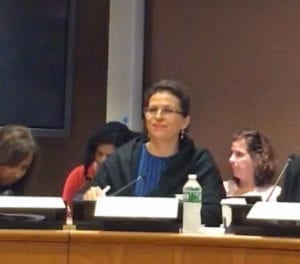
Gloria Moreno-Fontes Chammartin, ILO, says the right to collective bargaining applies to all workers regardless of status for ILO member countries. Credit: Solidarity Center
Opening the panel on migration and freedom of association, Gloria Moreno-Fontes Chammartin, ILO senior labor migration specialist, (min. 1:31:22), reminded the audience that freedom of assembly and association (FOAA) are core values of the ILO, and that FOAA is included in its constitution and Declaration of 1944. She outlined the various conventions and UN declarations (e.g., the 1998 ILO Declaration on Fundamental Principles and Rights at Work, which commits ILO member states to respect and promote the four categories of principles and rights at work whether or not they have ratified the relevant eight conventions on freedom of association and the right to collective bargaining, the elimination of forced or compulsory labor, abolition of child labor and the elimination of discrimination in respect to employment and occupation) that reaffirm migrant workers’ rights, regardless of migration status or nationality. For example, the right to collective bargaining applies to all workers regardless of status in ILO member countries.
Despite international labor standards and agreements, the situation for migrant workers is often dire on the ground. For example, “migrant workers make up nearly 90 percent of workers in some Gulf states, but enjoy few to no labor rights,” said Sarah Leah Whitson, Middle East director for Human Rights Watch (min. 1:39:49)). She said that 15 million to 20 million people are migrant workers in the Gulf and cover every job, skill and education spectrum, with the largest concentration of migrant workers in construction and domestic work.
Most of these workers face “a triangle of oppression:” a kefala (sponsorship) system that puts the power in the hand of a private employer; the near-universal practice of employers confiscating workers’ passports of workers as “insurance”; and recruiting fees that are often a financial hardship for workers and keeps workers in bad jobs. Workers can spend two to three years working just to repay loans taken out to cover recruiting fees.
At the same time, many of the 9 million guest workers in the United States, who enter the country on special visas, are in “industries excluded from labor law, de jure or de facto,” and industries that “are of a direct lineage to slavery and are enmeshed in the same political economy of race,” said Saket Soni, director of the National Guestworker Alliance, (min. 1:49:15). Like the kefala system, a guest worker’s visa in the United States is tied to the employer, which leaves them vulnerable to abuse. Workers in seafood processing, for example, have reported grueling work conditions, forced overtime, harassment and exploitation.
In one case, Soni said, forced compulsory overtime coupled with the threat of retaliation was so severe that workers “developed the motor capacity to work while sleepwalking for entire shifts at night.” If they complained, the employer reported them to Immigration Services. In at least one case, the level of exploitation was deemed forced labor by U.S. courts.
Meanwhile, the creation of the “Asia global factory” has led to the largest rural-to-urban migration in the history of mankind, said Sanjiv Pandita, Asia regional representative for Solidar Suisse (min. 1:59:14). The global supply chain relies on an “institutionalized mechanism that harvests cheap labor,” pulling people from rural areas to factory zones.
He said workers move to escape poverty, but wind up on the lowest tier of the supply chain. They work long hours in dangerous workplaces for subsistence wages because they lack FOAA rights, while multinational corporations profit. “Asia has the largest population of working poor people. This is why we have a huge crisis of democracy because workers do not have rights to form unions and demand their fair share of the wealth being created,” he added.
‘We need to challenge the idea that supply chains are too complex to handle’
For the fourth and final panel—Supply Chains, Business and Human Rights—Cathy Feingold, director of the AFL-CIO’s international department, opened the session (min. 2:11:35) by issuing a call for a new global standard to address the more complex problems workers face, the agreements and standards that have been set aside, and the rules that were not designed for worldwide supply chains.
“How do you exercise rights when you don’t know whom you work for or if you are made invisible?” she asked. “We need mandatory due diligence in supply chains. We need to extend judicial remedy through supply chains. We need to take this out of legal and policy discussions and make sure workers know how to use remedies. We must have new, innovative, worker-driven approaches. … And we need to recognize that we are in one, single movement.”
Amol Mehra (image in video, above), director, International Corporate Accountability Roundtable (ICAR), agreed (min. 2:22:06). “We need to challenge the idea that supply chains are too complex to handle. There are inflows and outflows, and governments can set controls to protect rights,” he said. “Communities must come together to demand the rights they deserve. To build that power, we need to tackle global power,” he said. Mehra added that governments have a duty to protect human rights—and should start conditioning benefits to companies on how those companies respect these rights, including freedom of association.
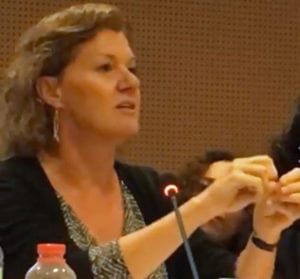
Jo Becker, Human Rights Watch, says children produce 15 percent of world’s gold but suppliers don’t ask if child labor is involved. Credit: Solidarity Center
When it comes to supply chains and violations of human and worker rights, “the laissez-faire system of enforcement is not working. Companies intentionally go to countries with weak labor laws and weak enforcement,” said Jo Becker, (min. 2:30:52), advocacy director for Human Rights Watch’s children’s rights division, which focuses on supply chains in three sectors: clothing produced for major brand names, gold mining and tobacco. Children produce 15 percent of the world’s gold, for example.
“They climb down shafts, are involved in many dangerous processes, handle mercury causing brain damage,” she said. However, “we cannot know if a particular gold product is made with child labor. The chain of production and sale is long and complex. We find that due diligence breaks down in the earliest stages of this process. Company representatives don’t ask suppliers how gold was produced or if children were involved.” Without binding rules, some companies try to follow the Guiding Principles on Business and Human Rights, others do not fully understand them and still others ignore them. “We believe the rules should be mandatory,” she said. “It would eliminate the race to the bottom.”
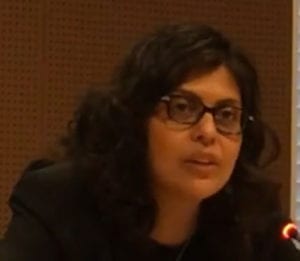
Alejandra Ancheita says Mexico sees violations of human rights every day. Credit: Solidarity Center
Closing the session, Alejandra Ancheita described obstacles to freedom of association in Mexico (min. 2:38:47). The executive director of the Project of Economic, Cultural and Social Rights (ProDESC) said the country sees violations of human rights every day. For workers, “one big obstacle to freedom of association rights is protection contracts,” she said. “These are signed between companies and a management-controlled union. A real union cannot gain recognition because of this. And company profits go up by reducing pay and benefits of workers under these contracts.” Protection contracts protect companies, not workers, she said. “Good will is not enough. We must understand the ties between supply chains and joint liability” and work “to make rights a reality.”
Special Rapporteur Maina Kiai ended the discussion (min. 2:49:27) by exhorting participants to join together, to meld worker rights activism with human rights activism, including working together to ensure the right to strike is included in the general comment of the UN Human Rights Committee. “Let’s figure out a summit to bring together the human rights groups and labor. We can only succeed by coming together. … We have to protest and protest and protest,” he said. “Human rights are not neutral. They are very clear.”
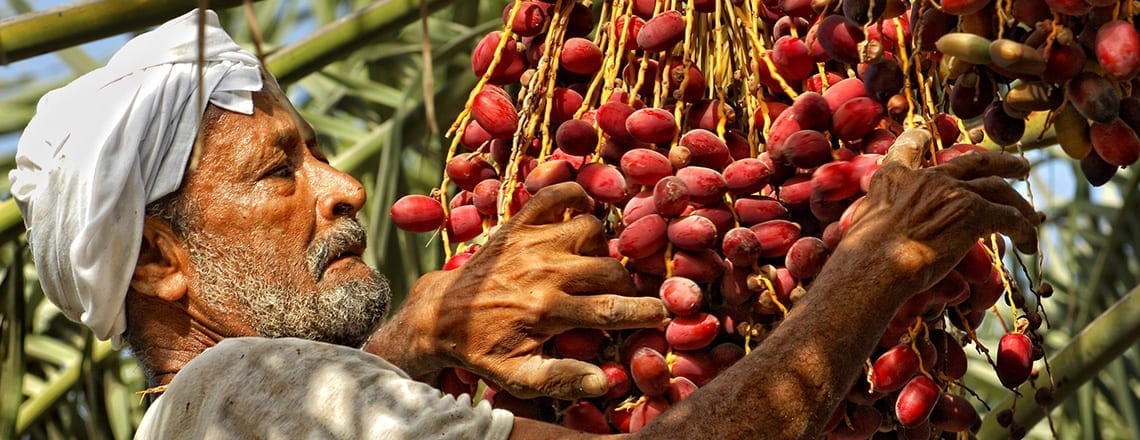
May 23, 2016
Update: The survey is now available in Spanish and French.
La encuesta está disponible en francés y español.
L’enquête est disponible en français et espagnol.
The United Nations Special Rapporteur is partnering with the Solidarity Center to research a report on the links between the political, social, and economic exclusion of workers, their associations and trade unions. The following article from the UN Special Rapporteur website describes how you can participate.
The globalization of the world economy in the past half-century has contributed to a dramatic rise in the power of large multinational corporations and has concentrated wealth in fewer hands. State power to regulate these business entities, meanwhile, has been simultaneously eroded and co-opted by elite economic actors themselves.
Unconstrained power – whether public or private in origin – is now, more than ever, a critical threat to the protection of human rights. This power shift has created a challenging environment for the enforcement of human rights, as Special Rapporteur Maina Kiai has documented in his two most recent reports on natural resource exploitation and the imbalance between how States treat businesses and civil society.
For his next report to the UN General Assembly (October 2016), the Special Rapporteur plans to explore a new dimension of this power shift: its effect on the rights to freedom of peaceful assembly and of association of workers – specifically the most marginalized portions of the world’s labor force, such as global supply chain workers, informal workers, migrant workers and domestic workers. He will also examine the gender and racial dimensions of the issue.
The Special Rapporteur is particularly interested in the links between the political, social, and economic exclusion of workers, their associations and trade unions, as expressed in:
- The limitation and/or criminalization of assembly and association rights in law and in practice (and acquiescence of the State when these rights are breached by state or private actors);
- The exclusion of workers in the informal economy from legal frameworks recognizing assembly and association rights;
- The strategy to informalize more work for the purpose of limiting or excluding workers from exercising their assembly and association rights;
- The lack of effective global governance of migration, which has led to the exploitation of migrant workers
The Special Rapporteur will also explore the interplay between the lack of assembly and association rights for workers and the health of these rights within a society as a whole.
What’s your opinion and experience?
The Special Rapporteur convened an expert consultation to discuss this subject in May 2016. But he would also like to hear your views. He is particularly interested in specific, real-world examples of how the assembly and association rights of workers are being both eroded and bolstered. These examples may be included in the report.
How to submit information for the report
For more details on the report, please see our concept note. For specific questions that the Special Rapporteur is looking to answer, please see the following questionnaires. Note that each file has three separate questionnaires: One for UN member states, one for businesses and one for civil society/unions/workers. Please answer only the questionnaire that corresponds to your position:
Questionnaires in English
Questionnaires in Spanish (coming soon)
Questionnaires in French (coming soon)
In responding to the questionnaire, please be sure to provide as much detail as possible and to specify which countries you are referring to.
Completed questionnaires should be e-mailed to [email protected]. We will be accepting submissions until June 30, 2016. You may submit your responses in English, French or Spanish.
The Solidarity Center will assist with researching the report. Responses to the questionnaires will be shared with select Solidarity Center staff prior to the publication of the report.
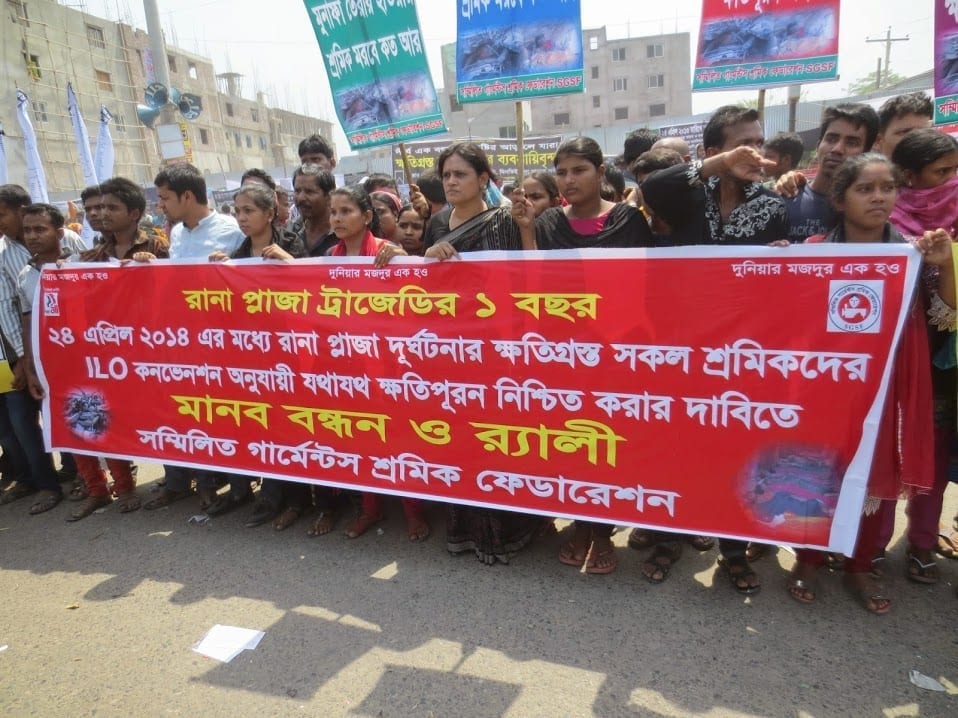
Dec 10, 2014
Each year on December 10, the global community marks International Human Rights Day, anchored in the founding document of the United Nations which asserts that each one of us, everywhere, at all times is entitled to the full range of human rights.
That founding document, the Universal Declaration of Human Rights, also lists “the right to form and to join trade unions” as a basic tenet of human freedom. For many workers around the world, the right to form unions is essential for ensuring the safe working conditions and living wages that are fundamental to human rights.
Two years ago, on November 24, the devastating fire at the Tazreen Fashion Ltd. garment factory in Dhaka, Bangladesh, killed 118 workers, the majority of them young women. Commentators at the time compared the disaster to the 1911 Triangle Shirtwaist Fire in New York, noting that moment in American labor history when young women garment workers began organizing their first unions.
The same phenomenon is taking root in Bangladesh, and for the same reasons. The momentum for union formation was accelerated by the April 2013 Rana Plaza building collapse in Bangladesh, which killed more than 1,100 workers. Following these twin tragedies, workers, primarily women, formed more than 200 new garment unions. Their rapid formation has been driven by the determination of women workers who have experienced how the past 30 years of job creation has not led to their economic or social advancement. They seized the moment to collectively join together to demand that jobs offer more than a meager paycheck.
It has been a nostrum of development economics for the past 20-plus years that merely creating garment-sector jobs was the key to women’s liberation and empowerment. True, approximately 80 percent of workers employed in the Bangladesh’s garment sector are women. True, millions of women now have an independent means of earning an income, which is important to raising women’s status within their family and community.
However, few adherents to this economic analysis have examined whether creating low-wage jobs has truly led to women’s empowerment in a way that is personal, cultural, sustaining or lasting. Rather, many economists and political scientists view Bangladesh and the global garment supply chain through a purely free-market perspective. Through this lens, any wages at all enable women to improve their status. Yet it is much more difficult to acknowledge that the real issue is the global supply chain within which women need to exert their power and genuinely take control of their own destinies inside and outside the home.
Statistical evidence suggests that women toiling at the bottom of the global garment supply chain in Bangladesh do, in fact, experience some social changes in contrast to women working in a subsistence agrarian economy. Research shows that a 10-hour-a-day, six-days-a-week job in the Bangladesh garment industry may improve women workers’ chances to send their children to school and keep them in there longer. However, these arguments are oversold. Women garment workers may or may not control their wages, depending upon gender-based power relations inside their homes. Often, they do not favor women.
Over the past 17 years that I have been involved with the Bangladesh labor movement, I have repeatedly seen how an income does not guarantee independence for a woman garment worker. This anecdotal evidence is backed up by fact. Research suggests that girls age 17 and 18 years old who live near garment factories actually drop out of school at a higher rate than their rural counterparts who go to work in the industry. Further, a 2009 study by the Bangladesh government’s National Bureau of Economic Research documents that non-garment workers’ mothers had a higher level of education than those of garment workers. And farm labor actually pays more than a job at a garment factory in the high-cost, high-inflation environments of Dhaka or Chittagong, according to a recent article in Dhaka’s Financial Express.
So if the one-dimensional argument that earning a wage results in women’s empowerment is fiction, what is the manifestation of real progress for women?
For the answer, I would point to prominent labor activists who have risen from the factory floors and now are organizing among their peers.
Kalpona Akter, Nazma Akter (no relation) and Nomita Nath, for example, all worked as child laborers in garment factories. They have emerged as real leaders, not because they made poverty wages as teens but because they dedicated their lives to uplifting the status of women workers in their society. They have found their power in fighting for jobs that do not starve, maim or kill women. And they know that vulnerable workers find empowerment when they have a union to represent them.
Workers struggle every day on Bangladesh’s factory floors. Women report that physical and verbal abuse are a matter of course. They are threatened when they do not make a quota or when they get pregnant. Or worse. Mira Boashak, president of a local union in Dhaka, was severely beaten in August by several men who had staked out her garment factory.
Despite these challenges, a young organizer told me earlier this year in Dhaka that prior to recent tragedies, her efforts to organize women into unions made her community think she was a troublemaker. Now, she said, she is seen as a champion of women’s rights and looked up to as a leader.
Real women’s empowerment—realized through asserting fundamental human rights.
